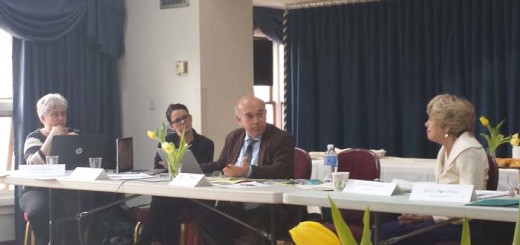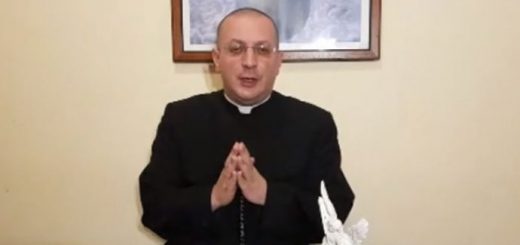Sr Monica Cavanagh on the Francis Effect

Sr Monica Cavanagh, congregational leader of St Mary MacKillop's Josephite Sisters, reflects on the leadership of Pope Francis from the point of view of a woman. (This article was originally published in Cathnews)
Pope Francis: Seeking the Wisdom of Women
I would like to consider Pope Francis’s leadership from the perspective of a woman. Over many years now I have experienced the emergence of the role of women within the church. I have grown up in a post Vatican II church community. The outcomes of this Council have shaped my spirituality, my theology and my understanding of scripture and ministry. I bring to my ministry as Congregational Leader many experiences of being a woman in today’s church. I have served in Pastoral roles at both Parish and Diocesan levels.
 In reflecting on Pope Francis: Modelling the Petrine Ministry through my eyes as a woman in leadership I will share what inspires me about Pope Francis’s Leadership and the role of women within the church from his perspective. I will do this by looking at his particular references to the role of women, the challenges to be faced and what I consider to be hopeful signs for the future.
In reflecting on Pope Francis: Modelling the Petrine Ministry through my eyes as a woman in leadership I will share what inspires me about Pope Francis’s Leadership and the role of women within the church from his perspective. I will do this by looking at his particular references to the role of women, the challenges to be faced and what I consider to be hopeful signs for the future.
God has a special place for the poor
Speaking to my heart as a leader is Pope Francis’ deep conviction that God’s heart has a special place for the poor EG 197 These words capture the direction Pope Francis’s leadership has been taking since the beginning of his Papacy.
At the time of the election, I sat with a group eagerly awaiting the news of who would be our new Pope. I wondered what difference this would make to a church shattered by abuse and declining in membership in the Western world. One memory that I hold from that day was his first gesture from the balcony. He appeared and we were introduced to Pope Francis. I immediately thought of St Francis of Assisi’s call to rebuild my church. Was this the man who would rebuild our church? Then he humbly invited the gathered faithful to pray for him – to give him their blessing before he blessed the crowd and this gesture signalled for me a change – a moment of hope that something new would emerge.
Qualities of Pope Francis’ leadership
From the first moment of his papacy, Francis indicated that serving with a heart full of love was a priority. In his homily on the day of his consecration as Bishop of Rome he spoke these words: ‘the Pope must open his arms to protect all of God’s people and embrace with tender affection the whole of humanity, especially the poorest, the weakest, the least important, those whom Matthew lists in the final judgement of love: the hungry, the thirsty, the stranger, the naked, the sick and those in prison. Only those who serve with love are able to protect’. This has been manifested in his gestures of reaching out to those in prison, to refugees and migrants, to the sick, the marglinised, the unemployed and most recently to the victims of sexual abuse – a leader indeed with a heart for the poor. This choice for those most deprived in society speaks to the heart of Religious women and those working for justice in our church and society. It reminds me of the call of so many Religious Founders who like Mary MacKillop encouraged her Sisters to ‘seek first the poorest and most neglected parts of God’s vineyard.
A particular issue facing our world today is that of human trafficking.
Pope Francis in his exhortation – the Joy of the Gospel states I have always been distressed at the lot of those who are victims of various kinds of human trafficking’. EG 211 The International Women’s Leadership UISG conference has over recent years made this one of its key priorities and has been taken up here in Australia by Religious women through the work of ACRATH – Australian Catholic Religious Against Trafficking. I am proud to say that Sisters within in my own Congregation are involved in addressing this priority.
Another appeal of Francis is his use of language. He calls us to be ‘missionary disciples’- to be women and men who are credible witnesses to the joy of living the gospel even at times if this takes us into the heart of the cross. He invites us to sit at the feet of Jesus in order that we may go out to meet God in the midst of the world – to be a leaven in the midst of humanity. All cultures and the church on the street are places for encounter with God. Francis has been there and lived there – in oneness with the people. He has experienced the joys and sufferings of his people and laughed and wept with them. It is within this reality that his mission heart has been formed.
Francis brings a discerning heart formed in his Jesuit training into considering the reality of everyday life for wounded humanity. He invites preachers to keep their ear to the people and to discover what it is that the faithful need to hear. A preacher needs to contemplate the word, and he also needs to contemplate his people. EG154 This is applicable to all who are in leadership roles today – to listen with the ears of our hearts, to be attentive to the movement of the spirit in our deliberations and our decision-making, toapproach life with the gaze of the Good Shepherd EG 125
Fr Robert Oliver recently stated in the National Catholic Reporter of 5 June 'Pope Francis is the kind of leader who makes it possible for those who assist him to bring forward ideas. Then he takes hold of these ideas … [then] the Catholic faithful, and indeed all people, will see that he will act quickly.'
Perhaps one of his most memorable statements was his advice to Pastors to be shepherds who have the smell of their sheep. Francis is alert to the realities and situations which are being faced by people in different parts of our world. He is showing this through his actions and movements. His first pastoral visit was to the tiny island of Lampedusa after the drowning of many refugees. Gathering with the people he spoke these words: When a few weeks ago, I heard the news – which unfortunately has been repeated so many times – the thought always returns as a thorn in the heart that brings suffering. And then I felt that I ought to come here today to pray, to make gesture of closeness, and also to reawaken our consciences so that what happened would not be repeated’. In his recent visit to the Astali refugee centre in Rome he singled out a Syrian family to hear the present emergency in their homeland. He also gave time to a Sudanese refugee. During his visit to the Holy Land he visited a Palestinian refugee camp, placing the refugee crisis as a major focus for this time. Can his pastoral heart touch the inhumane response of Australia to this issue?
It was not surprising that Pope Francis Apostolic Exhortation is titled ‘The joy of the Gospel’. His whole demeanour speaks of a man deeply in love with God, free to be himself and filled with the joy of living which he states is at the heart of ministry today – to bearers of good news. His very presence has caught the imagination of the world. His smiling face speaks of a man who knows that he is the Beloved of God, a man who has come to know the God who weeps in times of suffering and natural disasters and who in times of celebration rejoices with us. He has pondered deeply the virtue ofjoy. I have a sense that when people encounter the smiling face of Pope Francis their hearts are uplifted with joy and I sense what keeps the smile on Pope Francis’ face is the many human encounters that cause him to reflect ‘Today I met God in the feet of a prisoner, the tears of a refugee, the disfigured face of a young child, the bereaved mother and in the faces of people of all cultures.
Like Pope Francis I hold dear the virtues of compassion, humility and simplicity. His desire to be trusting of people in their circumstance of life resonates with my own desire to provide a space where all those within my sphere of influence can choose life.
I trust and hope that in my role in leadership I shall be closely in tune with the pulsating heart of God breathing joy, love, attentiveness, compassion and life at this moment in the history of the church, in my congregation and in the world so that I may too like Pope Francis will ‘become a facilitator of grace’.
Pope Francis and the Role of Women
Over these past months I have been listening to people’s responses to the Pope Francis’ effect. He has caught the imagination of people. I have been particularly keen to hear the voice of women. These were some of the things that I heard:
* Pope Francis brings a freshness
* This is the first time in ages that I have been interested in reading a papal document
* He has restored my faith in the church by his openness and willingness not to judge
* I love the fact that he speaks and acts from the heart
* He lives and breathes the heart of the gospel
And as the reporter Alice Laffey noted:
Throughout the world, women and their children make up the greatest percentage of human beings living in destitution. Their main concern is not women priests but food, health, education and physical safety. Francis' genuine concern for the real lives of the poor and suffering warmly embraces women.
When he visited the juvenile prison in Holy Week 2013 and washed the feet of the young prisoners including the feet of two young women many onlookers noted that this gesture signalled for them that there was a place for women in the church which Francis’ would lead. One writer titled a reflection ‘Women have feet too’. Patricia Rumsey
Women first Witnesses
This visit was shortly followed by an Easter reflection (4.3.2013) in which he stated that:
Women, the first witnesses of Christ’s Resurrection and have a special role in spreading the faith. Women have had and still have a special role in opening the doors to the Lord. The women were the first witnesses.
Only men are remembered as witnesses of the Resurrection, the Apostles, but not the women. This is because according to the Jewish law of the time, women and children were not considered reliable, credible witnesses. In the Gospels however women have a primary fundamental role … God does not judge according to human criteria: … the first witnesses of the Resurrection are women.
I am sure for some women there was a leap of joy in hearing this reflection. Here at last the voice of women in the scriptures is being confirmed and proclaimed. Marinella Perroni a theologian and leading member of the Association of Italian Women Theologians says for her this marked a significant change:
‘The fact that the Pope acknowledges that the progressive removal of female figures from the tradition of the resurrection … is due to human judgments, distant from those of God … introduces a decidedly new element compared to the previous papacy’.
For some time now women scripture scholars have been giving voice to Biblical women allowing the richness and deeper meaning of texts to be opened and explored, showing us that women’s roles have a place where God’s presence has been manifest.
We cannot limit ….
In July last year, on his return journey from World Youth Day in Brazil, Pope Francis spoke briefly about the issue of women in the church. He stated at this time that the door is closed with regard to women’s ordination but he went on to say ‘We cannot limit the role of women in the Church to altar girls or president of a charity, there must be more’ and went on to speak of ‘a more profound theology of women’. Sr Simone Campbell sss in Time Magazine reflected that Francis’ call for the creation of a deep theology of women, provides an opportunity for him to read and reflect on the work of women theologians all over the world writing about their experience and reflecting on the deep truths of our faith.
Also in the church …
On the occasion of the 25th anniversary of Pope John Paul II’s Apostolic Letter – On the Dignity and Vocation of Women, Francis once again drew attention to the role of women in the church. He spoke about how deeply he feels it when the role of women becomes one of servitude rather than one of service. It raises the question can women be valued more or as he asks ‘What presence does woman have?’ This question has been reflected upon by many women. What gift does the presence of woman have in today’s church? What might be different if this gift were truly understood and valued?
Women can help provide …
This leads us to the next reflection from Francis: Woman can help provide better insight into the nature of God. Woman has a particular sensibility for the ‘things of God’, above all in helping us understand the mercy, the tenderness, and the love God has for us. This statement provoked in me the memory of reading for the first time the book the Feminine of Face of God – the Unfolding of the Sacred in Women discovering here a more wholesome and inclusive understanding of the nature of God – a God who reaches down to lift our cheek tenderly, who feeds us and nourishes us with love like that of a mother with a child at the breast, who stands with us in the midst of suffering like the woman who once shared with me her how her image of God changed dramatically when she went through the struggle of post natal depression or the faithful catechist who for many children is the way they gain a glimpse into the faithfulness of God. Let us listen to these voices for they too will shape our understanding of God, theology and church.
We need to create …
The voice of woman matters Pope Francis state ‘We need to create still broader opportunities for a more incisive female presence in the Church EG 103 Cardinal Walter Kasper in an interview with Avveni the daily newspaper owned by the Italian Bishops’s conference reflected that there are areas in the church which do not require the jurisdiction of the ordained ministry. There are opportunities for women to serve in positions both in the Curia and on Pontifical Councils, he believes. There is a place for women in the decision-making bodies of the church. Let us begin with what is possible. Pope Francis perhaps needs to consider the influence of Clare on Francis of Assisi – the presence of a modern and visible Clare would go a long way in convincing many Catholic women that they too have a place at the table says Kathleen Cummings of New York Daily News.
Donella Johnson of OPW in Australia reflected:
In order to make more space for women, the Pope needs to appoint more women to visible roles of leadership within the church especially in the Curia were the highest level of decision-making occurs. He needs to surround himself with women. He needs to appoint them to key advisory roles and listen to their advice. And he must consult with lots of different kinds of women. He must embrace diversity.
Here I wish to express my appreciation for the ministry of those who serve through the Office for the Participation of Women and group such as WATAC – Women and the Australian Church – who keep the role of women in this country on the agenda of church and society.
I too have considered ….
Sister Christine Schenk, executive director of FutureChurch says that Pope Francis is doing great at the symbolic level since his election but the proof will be in what steps the Vatican takes to begin to incorporate women’s voices and experience at all levels of church ministry and decision-making.3.4.2013
This is re-iterated in an address Pope Francis gave on 25 January this year to an Italian women’s group. I too have considered the indispensable contribution of women in society. I have rejoiced in seeing many women sharing some pastoral responsibility with priests in accompanying people, families and groups, as in theological reflection and I have expressed my hope that greater room can be made for a more capillary and incisive female presence in the Church and once again affirmed women’s gifts of delicateness, special sensitivity and tenderness. Let us pause here for a moment and honour all those women who have birthed new insights into pastoral ministry through their presence.
Seeking the Wisdom of Women
Pope Francis writes: Demands that the legitimate right of women be respected, based on the firm conviction that men and women are equal in dignity, present the Church with profound and challenging questions which cannot be lightly evaded. EG 104
What then are these profound and challenging questions? How can we talk about an equality in dignity when women who are as equally qualified, skilled and experienced as men are not yet involved in key decision making levels of the universal church? How do women hold the paradox of opening the door of welcome to those most vulnerable in society and closing the door on the possibility of ordained ministry? How can the gifts of women be more recognised within the life of the church considering that they represent more than half the Congregation and in many communities are the sustainers of church ministry? How will Pope Francis engage with Women Leaders of Religious Congregations who bring a wisdom and integrity through their roles as leaders? How will he continue to dialogue in the current situation with the American Religious Women’s Conference LCWR? What can be learnt about women’s leadership from the way the leaders of LCWR have responded with integrity? How willing is he to learn to hold in a dignified way difference and diversity?
Perhaps the challenges are best reflected in this report that appeared in the Tablet International Catholic News Weekly 0n 12 March 2014. In a survey in which 1400 people participated, Abigail Frymann identified three key areas that the pope most urgently needs to address:
* 73% of participants said he must prioritise developing the role of women
* 72% highlighted the need to press ahead with curial reform
* 68% wanted him to focus on child protection, the censure of clergy who have abused or covered up abuse and care for victims.
Donella Johnston from the Office for Participation of Women in Australia writes on reflecting on this survey:
By appointing more women to top leadership positions in the Church, the Pope could address all three of these issues at the same time. Contemporary research confirms that organisations that encourage gender diversity tend to have higher levels of effectiveness and better financial performance than male dominated structures. These organisations also produce more effective leaders who act with greater integrity, show greater evidence of diversity of thought and perspective and foster greater unity and collegiality and an atmosphere of trust, respect and confidence amongst their members.
Sr Patty Faulkner perhaps sums it up well when she writes:
Pope Francis’ greatest challenge will be to translate gestures and words into Church governance structures, and liturgical and pastoral life to reflect a genuine and authentic catholicity.
HOPES FOR THE FUTURE
Pope Francis’s commitment to embrace all of humanity and to be a church which is bruised, hurting and dirty because it has been out on the streets – to be the face of a compassionate God is the greatest hope I sustain in the future.
As he creates space for women’s voices in the church, my hope is that he continues to reflect on how the leadership of women in the gospels and the early church was exercised; that his words and gestures are able to be transformed into action; that he continues to seek the wisdom of women through dialogue in appropriate areas of life and that he is able to incorporate their wisdom gifts, skills and expertise as he moves towards a more transparent, accountable and compassionate church where different vocations and gifts are complementary and mutually enriching.
Peter and Martha
And perhaps one day Martha’s leadership and declaration of faith will be as honoured as Peter’s.
















